Introduction
Welcome to our study of Acts 1, where we await, with the early disciples, the fulfillment of Jesus' promise. In this post, we'll dive into the historical and theological depths of Acts 1, understanding its significance in the broader narrative of the New Testament.
Luke's Writing to Theophilus:
From Gospel to Church History
Before jumping into Acts 1, it's important to understand its place in Luke's writings. We find Luke's writing, the Gospel of Luke, it parallels the other gospels in describing Jesus' life, death, and resurrection. However, his second writing, the book of Acts, stands uniquely as a history book, chronicling the establishment and growth of the early church. Written to Theophilus, a Gentile official, between 60-68 AD, Acts shifts from the narrative of Jesus to the actions of His Apostles, primarily Peter and Paul.
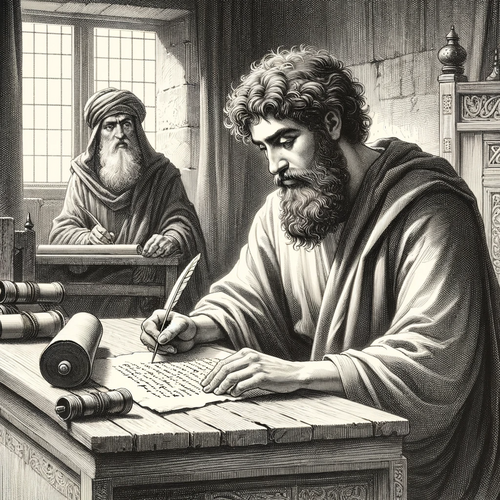
Historical and Cultural Context of Pentecost
Pentecost in Jewish Tradition:
Pentecost, also known as the Feast of Weeks (Shavuot in Hebrew), is one of the three major Jewish festivals, alongside Passover and the Feast of Tabernacles. It falls fifty days after Passover and marks the end of the Counting of the Omer, a period of seven weeks following Passover. This festival originally celebrated the spring harvest and the first fruits of the wheat harvest in Israel.
In Jewish tradition, Pentecost also commemorates the giving of the Torah to Moses at Mount Sinai. This adds a significant layer of spiritual and religious importance to the festival, as it's not only an agricultural celebration but also a remembrance of the covenant between God and Israel.
Pentecost, also known as the Feast of Weeks (Shavuot in Hebrew), is one of the three major Jewish festivals, alongside Passover and the Feast of Tabernacles. It falls fifty days after Passover and marks the end of the Counting of the Omer, a period of seven weeks following Passover. This festival originally celebrated the spring harvest and the first fruits of the wheat harvest in Israel.
In Jewish tradition, Pentecost also commemorates the giving of the Torah to Moses at Mount Sinai. This adds a significant layer of spiritual and religious importance to the festival, as it's not only an agricultural celebration but also a remembrance of the covenant between God and Israel.
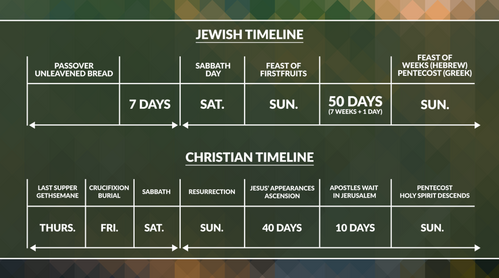
The Ministry of Peter in Acts 1
The early chapters of Acts focus on Peter's ministry. Luke begins with a review of Jesus' post-resurrection appearances, teachings about the kingdom, and His ascension. The disciples are instructed to wait in Jerusalem for the promised Holy Spirit. This waiting period is crucial, as it represents a shift from Jesus' physical presence to the spiritual empowerment of His followers.
The Anticipation of the Holy Spirit in Acts 1
As we dive into Acts 1, we find ourselves immersed in a pivotal moment of transition and expectation. The disciples, having witnessed the profound mysteries of Christ's resurrection, now grapple with His impending ascension and the promise of the Holy Spirit.
A Time of Unity and Anticipation:
In Jerusalem, the air is thick with anticipation. The disciples, united in purpose yet diverse in their backgrounds, gather together, holding on to Jesus' promise of the Holy Spirit. This gathering is not just a physical convergence but a profound spiritual union, an embodiment of faith and hope amidst uncertainty. Their unity, forged through shared experiences and a common mission, sets a powerful example for the church throughout the ages.
A Time of Unity and Anticipation:
In Jerusalem, the air is thick with anticipation. The disciples, united in purpose yet diverse in their backgrounds, gather together, holding on to Jesus' promise of the Holy Spirit. This gathering is not just a physical convergence but a profound spiritual union, an embodiment of faith and hope amidst uncertainty. Their unity, forged through shared experiences and a common mission, sets a powerful example for the church throughout the ages.
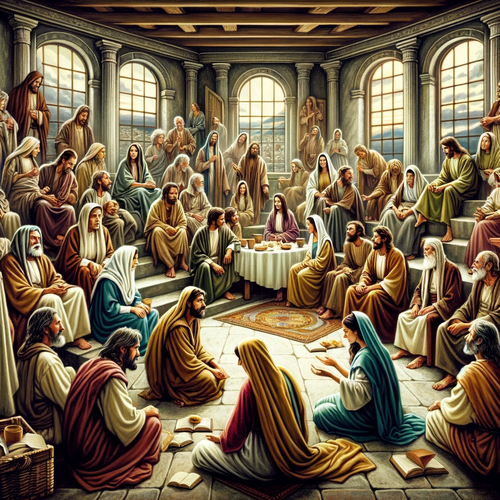
Jesus' Ascension: A Moment of Awe and Promise:
The ascension of Jesus is a moment etched in the annals of Christian history, marked by awe and wonder. As Jesus is lifted up before their eyes, a tangible sense of both loss and hope fills the air. This event is not merely a miraculous spectacle; it's a pivotal turning point. It signals the end of Jesus' earthly ministry and the beginning of a new chapter for the disciples – a chapter where they will transition from followers to leaders, from learners to bearers of the Gospel.
The ascension of Jesus is a moment etched in the annals of Christian history, marked by awe and wonder. As Jesus is lifted up before their eyes, a tangible sense of both loss and hope fills the air. This event is not merely a miraculous spectacle; it's a pivotal turning point. It signals the end of Jesus' earthly ministry and the beginning of a new chapter for the disciples – a chapter where they will transition from followers to leaders, from learners to bearers of the Gospel.
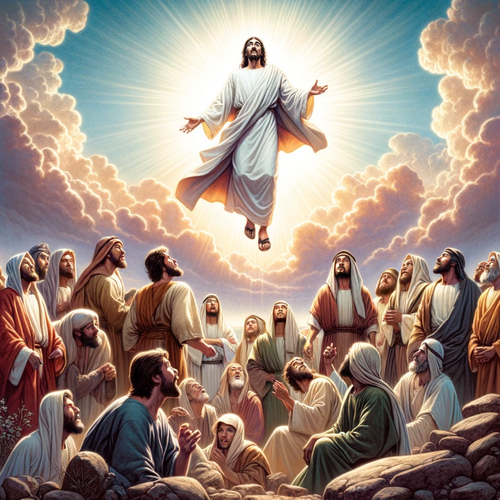
The Role of Prayer and Preparation:
In these days of waiting, the disciples are not passive. They engage actively in prayer, seeking divine guidance and wisdom. This period of prayerful waiting is as crucial as the action that will follow. It's a time for spiritual preparation, for aligning their hearts and minds with God's will. Their devotion to prayer exemplifies the power of communal intercession and sets a pattern for Christian life, underscoring the significance of seeking God’s guidance in times of transition and decision-making.
In these days of waiting, the disciples are not passive. They engage actively in prayer, seeking divine guidance and wisdom. This period of prayerful waiting is as crucial as the action that will follow. It's a time for spiritual preparation, for aligning their hearts and minds with God's will. Their devotion to prayer exemplifies the power of communal intercession and sets a pattern for Christian life, underscoring the significance of seeking God’s guidance in times of transition and decision-making.
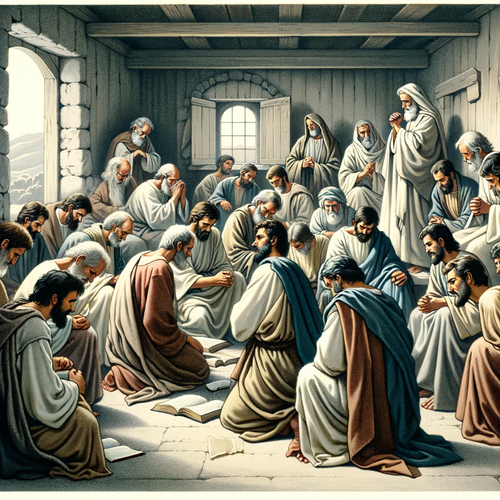
The Implications for the Modern Church:
The events of Acts 1 resonate deeply with the contemporary church. They remind us of the importance of unity in diversity, the power of shared anticipation, and the transformative nature of prayerful waiting. As we reflect on this chapter, we are reminded that periods of waiting are not merely times to endure but opportunities to prepare, pray, and align ourselves with God’s purposes.
The events of Acts 1 resonate deeply with the contemporary church. They remind us of the importance of unity in diversity, the power of shared anticipation, and the transformative nature of prayerful waiting. As we reflect on this chapter, we are reminded that periods of waiting are not merely times to endure but opportunities to prepare, pray, and align ourselves with God’s purposes.

The Challenge of Waiting
In exploring Acts 1, I'm reminded of a personal struggle with waiting and the frustration of being patient. Years ago, I faced a significant crossroads in my life. Fresh out of high school, I was torn between the allure of immediate action through military service and the uncharted potential of college education. Financial constraints and a lack of visible support clouded my vision of the latter path.
Driven by a mix of fear, impatience, and a desire for quick resolution, I leaned towards joining the military. It felt like the only viable option. I remember feeling the pressure of making a swift decision, one that seemed to offer a clear direction in the midst of uncertainty. But was it the right choice? In retrospect, only God knows.
This decision, made in haste and without seeking divine guidance, set the tone for subsequent choices in my life – many of which led me down paths I later regretted. It was a decision rooted in selfish motives, not in patient waiting for God's direction.
Reflecting on this now, I see how it parallels the disciples' experience in Acts 1. They, too, were at a crossroads, facing uncertainty about their future after Jesus' ascension. Yet, unlike my younger self, they chose to wait. They gathered in unity, praying and seeking God's guidance, trusting in His promise.
This chapter in Acts teaches us about the power of waiting on God. It's a lesson in trusting His timing, even when the world urges us to hurry. We learn that in the waiting, there is growth, learning, and an opportunity to align our desires with God's will.
Looking back, I wish I had embraced the art of waiting, seeking God's guidance rather than rushing ahead. It’s a lesson I carry with me, a reminder of the importance of patience and faith in the face of life's crossroads.
Driven by a mix of fear, impatience, and a desire for quick resolution, I leaned towards joining the military. It felt like the only viable option. I remember feeling the pressure of making a swift decision, one that seemed to offer a clear direction in the midst of uncertainty. But was it the right choice? In retrospect, only God knows.
This decision, made in haste and without seeking divine guidance, set the tone for subsequent choices in my life – many of which led me down paths I later regretted. It was a decision rooted in selfish motives, not in patient waiting for God's direction.
Reflecting on this now, I see how it parallels the disciples' experience in Acts 1. They, too, were at a crossroads, facing uncertainty about their future after Jesus' ascension. Yet, unlike my younger self, they chose to wait. They gathered in unity, praying and seeking God's guidance, trusting in His promise.
This chapter in Acts teaches us about the power of waiting on God. It's a lesson in trusting His timing, even when the world urges us to hurry. We learn that in the waiting, there is growth, learning, and an opportunity to align our desires with God's will.
Looking back, I wish I had embraced the art of waiting, seeking God's guidance rather than rushing ahead. It’s a lesson I carry with me, a reminder of the importance of patience and faith in the face of life's crossroads.
Conclusion
As we conclude our exploration of Acts 1, we are left with profound insights that echo through time to our modern experiences. This chapter, rich in historical and spiritual significance, serves as a timeless reminder of the value of unity, patience, and the pursuit of divine guidance.
The disciples' journey, marked by anticipation and reliance on God's promise, offers a blueprint for our faith walk. In a world that often demands swift decisions and instant results, the lesson of Acts 1 is particularly resonant. It teaches us the virtue of waiting on God's timing, the strength found in communal prayer, and the importance of aligning our hearts with His will.
As we face our crossroads, uncertainties, and transitions, may we draw inspiration from the early believers in Acts 1. Let us embrace the art of waiting, not as a passive state, but as an active, prayerful preparation for the plans God has for us. In doing so, we open ourselves to the transformative power of faith, and the endless possibilities that unfold when we align our paths with God's purpose.
The disciples' journey, marked by anticipation and reliance on God's promise, offers a blueprint for our faith walk. In a world that often demands swift decisions and instant results, the lesson of Acts 1 is particularly resonant. It teaches us the virtue of waiting on God's timing, the strength found in communal prayer, and the importance of aligning our hearts with His will.
As we face our crossroads, uncertainties, and transitions, may we draw inspiration from the early believers in Acts 1. Let us embrace the art of waiting, not as a passive state, but as an active, prayerful preparation for the plans God has for us. In doing so, we open ourselves to the transformative power of faith, and the endless possibilities that unfold when we align our paths with God's purpose.
Resources:
Bruce, F. F. (1988). The Book of Acts. Eerdmans.
Stott, J. R. W. (1994). The Message of Acts. InterVarsity Press.
Mazzalongo, M. (2017). "Acts Bible Study."
Additional references include insights from various theological and historical texts on the Book of Acts and the early Christian church.
Bruce, F. F. (1988). The Book of Acts. Eerdmans.
Stott, J. R. W. (1994). The Message of Acts. InterVarsity Press.
Mazzalongo, M. (2017). "Acts Bible Study."
Additional references include insights from various theological and historical texts on the Book of Acts and the early Christian church.
